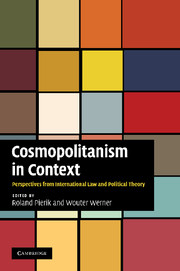Book contents
- Frontmatter
- Contents
- 1 Cosmopolitanism in context: an introduction
- Part I Environmental protection
- Part II World Trade Organization
- Part III Collective security and intervention
- Part IV International Criminal Court
- Part V International migration
- Part VI Conclusion
- 12 Can cosmopolitanism survive institutionalization?
- Index
- References
12 - Can cosmopolitanism survive institutionalization?
Published online by Cambridge University Press: 06 December 2010
- Frontmatter
- Contents
- 1 Cosmopolitanism in context: an introduction
- Part I Environmental protection
- Part II World Trade Organization
- Part III Collective security and intervention
- Part IV International Criminal Court
- Part V International migration
- Part VI Conclusion
- 12 Can cosmopolitanism survive institutionalization?
- Index
- References
Summary
Today, the question is not whether to be cosmopolitan or not but what kind of cosmopolis one should prefer, against what particularity should one be poised today.
This book has examined the relationship between cosmopolitanism as a moral standard and the (legal) institutions in which cosmopolitan norms and principles are to be implemented. The several chapters have analyzed five areas of global concern: environmental protection, economic regulation, peace and security, the fight against international crimes, and migration. The question regarding the relation between moral cosmopolitanism and legal institutions has gained renewed attention in the past few decades, mainly for two reasons.
In the first place, cosmopolitan norms affect many areas of contemporary life. As Jeremy Waldron has argued, these cosmopolitan norms have penetrated daily life as “a dense thicket of rules that sustain our life together, a life shared by people and peoples, not just in any particular society but generally on the face of the Earth.” Cosmopolitan ideals have also found their way into international legal documents and have inspired the establishment of international institutions. Increasingly, international law has incorporated notions such as “the common bonds” and the “shared heritage” of all peoples, the idea of human dignity, or the notion that environmental protection is a “common concern of humankind.” Of course, this is not to say that all international institutions and regimes are now founded upon cosmopolitan principles or moving progressively towards ideals of global justice.
Information
- Type
- Chapter
- Information
- Cosmopolitanism in ContextPerspectives from International Law and Political Theory, pp. 277 - 289Publisher: Cambridge University PressPrint publication year: 2010
